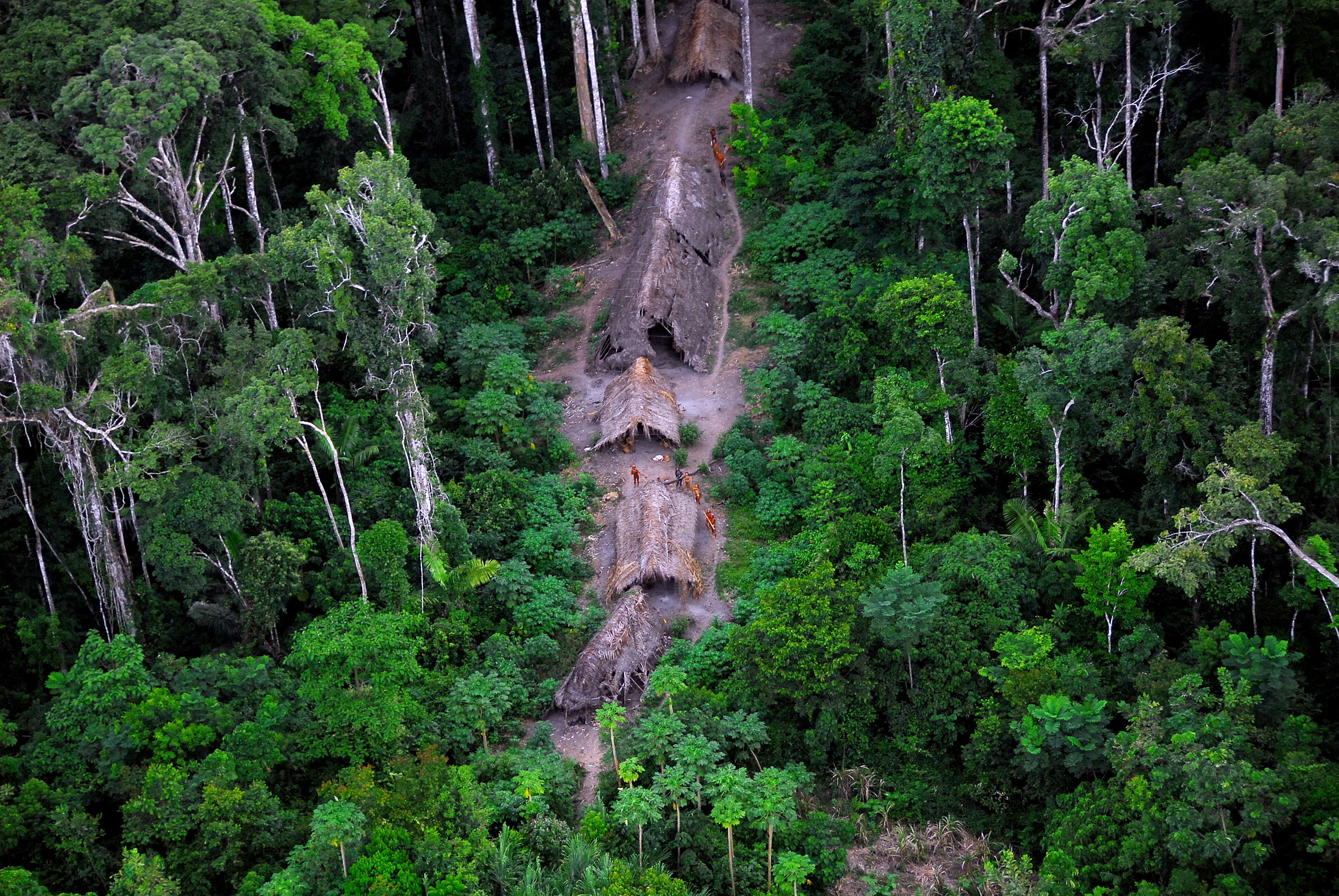
The Brazilian bishops' Indigenous Missionary Council fears that at least five isolated Indigenous groups similar to this one are in imminent risk of being exterminated in the Amazon forest. (CNS/Courtesy of FUNAI/Gleilson Miranda)
In 1997, the Brazilian government awarded the Karipuna tribe more than 377,890 acres of their ancestral land in the Amazon region to create the Jacy Parana Reservation. The land, larger in area than Los Angeles, was to be their safe haven, to grow food, hunt and fish just as their families had done for hundreds of years.
Their peaceful way of life, however, did not last long.
By 2015, ranchers, farmers and lumber barons invaded their land on a daily basis, bringing with them diseases that killed off the Indigenous by the dozen. According to the Indigenous Missionary Council (CIMI), a public prosecutor said in 2017 that the situation of the Karipuna people was "one of imminent genocide."
Surrounded by all sides and fighting off invaders trying to sell off part of their reservation, the Karipuna sought help from CIMI, an entity linked to Brazil's national bishops' conference that works with Indigenous all over Brazil for better living conditions and toward the demarcation of their lands.
Today, Catholic sisters — with a 50-year history of advocating for Brazilian Indigenous populations in their struggle for land rights and cultural survival — continue to show up in solidarity.
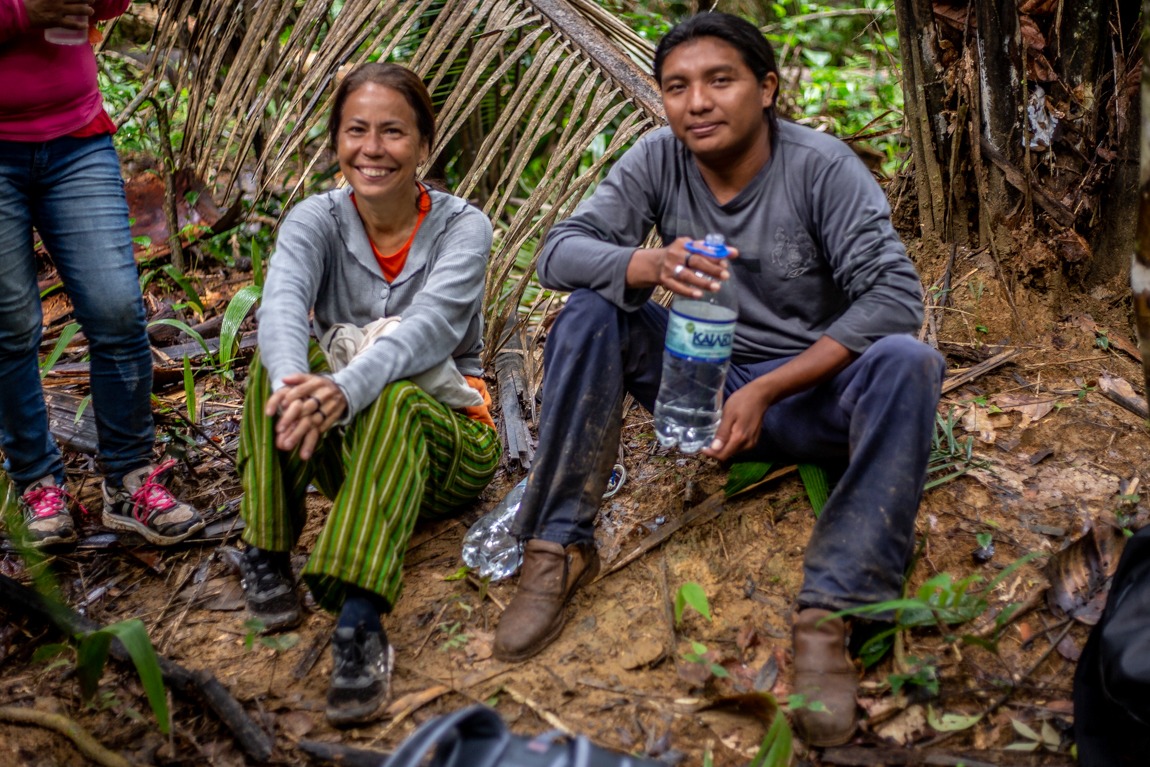
Franciscan Catechist Sr. Laura Vicuña with one of the members of the Karipuna people she helps in the Amazon region (Courtesy of Laura Vicuña)
Sr. Laura Vicuña Manso lives in Pôrto Velho, in the Amazon region, along with three other Franciscan Catechist sisters. The sisters work directly with the Karipuna people, alongside CIMI.
"These people were almost all massacred, with only eight of their entire tribe surviving," she told GSR, adding that the Yanomami, Guarania Kaiowá and Guajajara people also experienced violence and violations similar to the Karipuna.
According to a 2021 CIMI report, illegal invasions of Karipuna land increased by 44% that year.
Today, the population of the Karipuna people ranges in the low 60s, and the Franciscan Sisters assist a community of 30 of them.
"We travel an hour by car and then another five hours by boat to visit them," she said.
Manso, who has been working with Indigenous communities in the Amazon region for the past 23 years, started working with the Karipuna people seven years ago.
Nonetheless, the sister said she is heartened by the community's optimism, noting that their "capacity for resistance is in fact very much related to the issue of spirituality and the worldview that they have; the immense joy that one of the survivors of the massacre transmits even today is inspiring."
Indigenous populations are found practically all across Brazil: deep in the Amazon Forest, the plains of the Center-West, and large metropolitan areas. Like the Karipuna, these populations are often aided by religious sisters who are devoted to improving the lives of these original inhabitants.
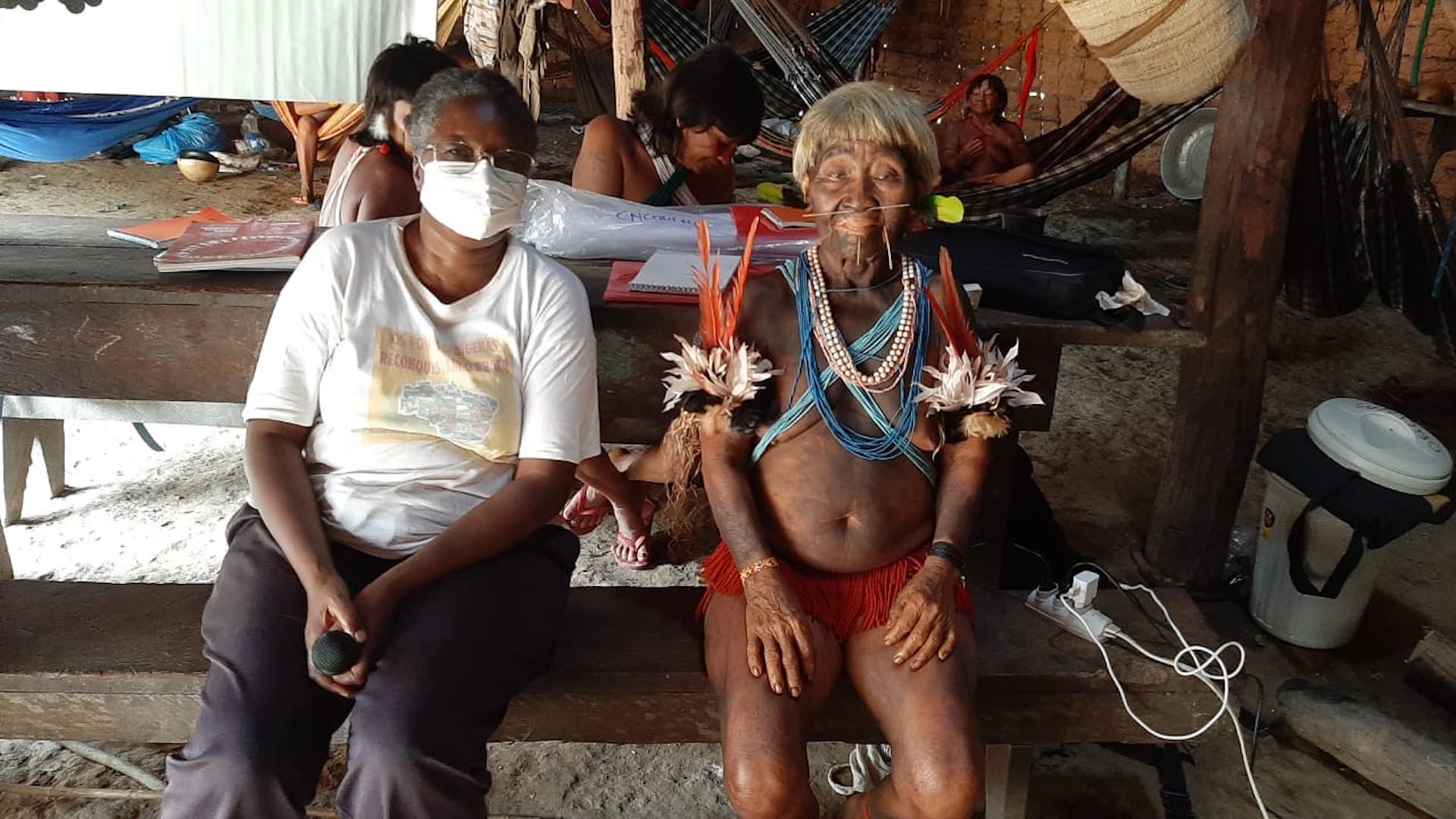
Consolata Missionary Sr. Mary Agnes Mwangi with an Indigenous person from the Yanomami tribe she works with in Rondônia, Brazil. (Courtesy of Mary Agnes Mwangani)
Advertisement
Consolata Missionary Sr. Mary Agnes Njeri Mwangi came to Brazil from Kenya in 2000 to work with the Yanomami in Roraima state, also located in the Amazon region.
Mwangi and three other sisters (from Tanzania, Portugal and Mozambique) work with 29 Yanomami communities and a population of almost 1,000 people, continuing the Institute of the Consolata for Foreign Missions' ministry to the Yanomami in Brazil that begin in 1965.
They help train health agents, monitor Yanomami women and hold workshops on human rights and constitutional rights for the Indigenous.
In addition to learning Portuguese, they also had to learn to speak Yanomami, translating materials and teaching in this Indigenous language, which resembles very little either Portuguese or Spanish.
The four religious don't live near a city, but rather, in a small wooden house in the forest. "We hunt pigs, we catch fish, we look for fruit, and we have a small farm where we grow cassava and bananas," Mwangi said, adding that they're rarely at home since they seem to always be traveling to visit villages.
Some of these visits require five to nine hours of walking; with others, they need to take a boat. The sisters stay in these communities from a week to a month.
Of the roughly 123,000 cases of malaria registered in Brazil in 2022, almost 10% of them occurred in Yanomami territory. "If authorities don't do something, these people could suffer a real extinction," said Sr. Mary Agnes Njeri Mwangi, a Consolata Missionary
Since arriving in Yanomami territory, Mwangi has been concerned.
"If authorities don't do something, these people could suffer a real extinction," she said. "Now they are very fragile, the children are very weak, and it is sad."
Malaria in particular is "out of control in this region," she said.
Of the roughly 123,000 cases of malaria registered in Brazil in 2022, almost 10% of them occurred in Yanomami territory, according to federal health agencies.
"We are trying to teach young Indigenous so that they can teach the elders how to take medicine correctly," she said, adding that many do not take the drugs as prescribed.
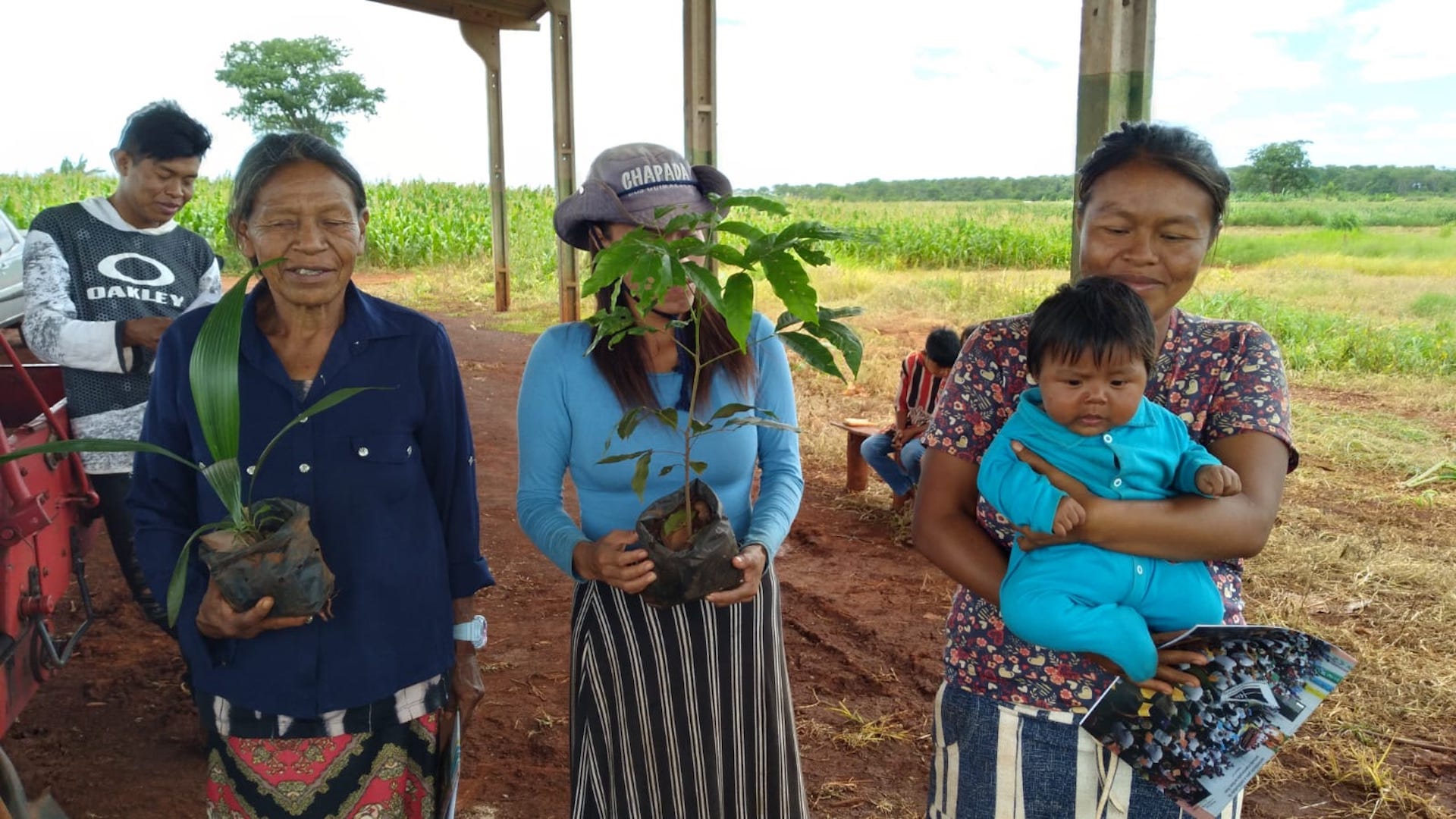
One of the services Catholic sisters provide the Guaraní-Kaiowá people in Dourados, Brazil, is the distribution of seedlings to plant gardens and grow food in their territory. (Courtesy of Zelia Batista)
Land rights
Not even the six years Franciscan Catechist Sr. Zelia Maria Batista lived in the Amazon region prepared her for what she found in Dourados, Mato Grosso do Sul.
"The impact for me was huge," she said of ministering to the Guarani-Kaiowá people. "The vulnerability with which the Guaraní-Kaiowá people live here is incredible."
She said the Guaraní live on tiny islands surrounded by soy, sugarcane and corn plantations. "There, they survive and drink polluted water, because pesticides have already polluted the source of water that they once believed to be safe to drink," Batista sighed.
The Guaraní people today live to regain their ancestors' lands, which the Brazilian government claimed after the Paraguay War of 1864-70.
"All this territory that we know today as Mato Grosso do Sul was inhabited by the Guaraní," she said.
With the end of the war against Paraguay, many Brazilian ex-combatants stayed in the region and occupied the territory that belonged to the Guaraní. The Vargas government pushed through a colonization program, privatizing their land.
At the end of the 1920s, eight reservations were created that confined the entire Guaraní nation to only a small portion of their land.
"So now they live to regain these properties, which are often within farmlands," Batista said. "And that's when all the conflict arises."
Batista helps the Guaraní alongside five other sisters from two Catholic congregations — Franciscan Catechists and the Servants of the Holy Spirit — working on sustainability projects and community gardens.
One of the ways the Pankararu Indigenous make money is by selling their crafts in local shopping malls in the city of São Paulo. (Courtesy of Lucia Gianesini)
Indigenous in the city
Franciscan Catechist Sr. Lucia Gianesini works with Indigenous peoples in the state of São Paulo in a totally different context: that of a large metropolis.
"Indigenous peoples in urban areas are not being recognized," said the sister, who is also CIMI's national vice president. In São Paulo, Franciscan Catechist sisters work with 10 to 12 ethnicities, including the Pankararu, Pankarare, Fulni-ô and Kariri Xokó.
"When the Indigenous leave their villages, they don't come to the city because they want to," Gianesini said. "They come looking for better living conditions. They come because there is no health care and often poor education in their territory."
Though there are more than 41,000 Indigenous people living in the state of São Paulo, "the concrete jungle that is São Paulo city is taking the Indigenous' identity away" as they lose their visibility over time, Gianesini mourned.
She said members of the Pankararu tribe helped build the governor's residence and a soccer stadium in one of São Paulo's wealthiest neighborhoods, Morumbi, in the 1950s, '60s and '70s.
Now, the tribe lives in a community of 180 families next door to the stadium, in the Real Parque area — home to some of the city's many slums, she said, "on the outskirts of the outskirts of São Paulo in unsanitary conditions."
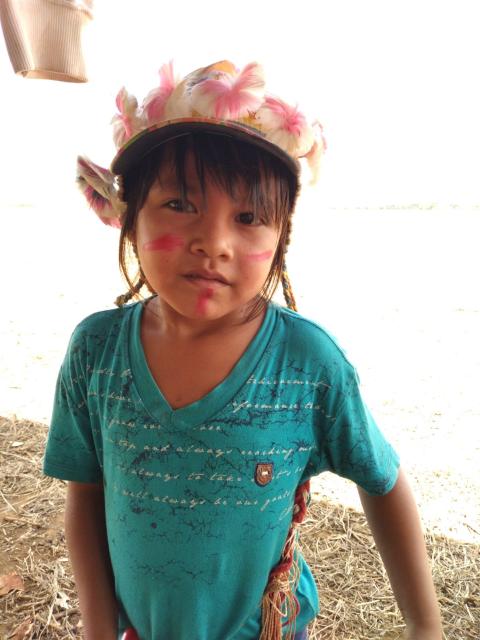
Children like Geny, from Guaraní-Kaiowá tribe, are helped by Franciscan Catechist Sr. Zelia Batista at Laranjeira Nhanderu territory in Dourados, Brazil. (Courtesy of Zelia Batista)
"The concrete jungle that is São Paulo city is taking the Indigenous' identity away" as they lose their visibility over time.
— Franciscan Catechist Sr. Lucia Ginaesini
Data from the Ministry of Education shows that many Indigenous schools do not have filtered water, have no electricity and do not have sewage systems.
The sisters work with Indigenous in several segments, including education, health and land rights.
"Many don't even know we're nuns," Gianesini laughed. "All they know is that it is really good when we visit them."
But if these sisters give much to the Indigenous populations they help, they also receive much from these peoples.
"The Guaraní-Kaiowá people offer humanity a special spirituality about care," Batista said. "They were raised to admire and care for nature, not seeing nature as an object, but as a brother, a sister who needs care."





